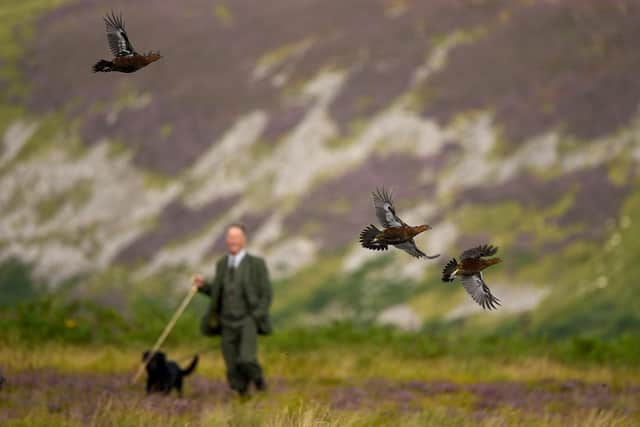Grouse shooting licensing scheme must not damage this world-class draw to Scotland – Ross Ewing
There is no shortage of genuinely world-class experiences in Scotland to draw visitors from home and abroad, whether it be golf, whisky distilleries or the Edinburgh Festival. Perhaps a less well-recognised, but equally valid, addition to that list is grouse shooting.
Each year, scores of tourists from Europe, America, the Middle East and many other places visit Scotland to sample what is seen as the pinnacle of world-class country sports. This week, however, the sector stands at a crossroads, as new legislation that will introduce a licensing scheme for grouse shooting enters its final stages at Holyrood.
Advertisement
Hide AdAdvertisement
Hide AdThe scheme is a product of the Scottish Government’s Independent Review of Grouse Moor Management, published in 2019, which said there may need to be licensing, depending on populations of breeding golden eagles, hen harriers and peregrines on or near grouse moors being in favourable condition within five years. Yet, those pre-conditions were sidelined when the government announced a year later that it was pressing ahead with a scheme anyway.


Licensing will heap bureaucracy onto rural estates and their employees, including gamekeepers and shepherds. Any estate wanting to shoot grouse will need to apply to NatureScot for a licence to do so, while the use of certain wildlife traps and muirburn – the rotational burning of heather – will also be subject to separate licensing regimes. Peer-reviewed science has shown that such activities are delivering decisive benefits for biodiversity and nature, so it is important that the licensing schemes are as light-touch as possible.
The big contention is that the legislation goes far beyond the stated intention of deterring the persecution of raptors by introducing a broad range of relevant offences under which licences can be suspended or revoked. Many of these offences bear no connection to land managed for grouse shooting, raising questions about the legislation’s proportionality.
As the Bill has made its way through parliament, the government has, to its credit, adopted several common-sense amendments which have given the legislation a greater chance of being workable in the long-term. This includes extending the grouse licence duration from a year to up to five years, and removing the ability for NatureScot to suspend licences without proof of criminality. It does, though, follow a pattern whereby vital rural sectors are being hampered by legislation without policymakers understanding their proposals’ full consequences.
Government-commissioned research makes clear the vital contribution of grouse moor management to the socio-economic integrity of rural Scotland, with the sector funded privately rather than through public cash, and direct employment per hectare significantly higher than other comparable land uses, along with significant ‘downstream’ impacts, with hotels, restaurants, trades and retailers in fragile areas financially supported by estates’ investment and the expenditure of tourists visiting to shoot grouse.
When First Minister Humza Yousaf took office last year, he spoke of the need to “reset” government’s relationship with business. Rural estates are important businesses within the countryside, but concur with the need for a change of approach. We accept the licensing schemes will become law soon, but ensuring that they are measured and practical, and that law-abiding businesses are supported in delivering social, economic and environmental benefits, is what is needed to retain grouse shooting’s position as a world-class draw to Scotland.
Ross Ewing is director of moorland at Scottish Land & Estates
Comments
Want to join the conversation? Please or to comment on this article.
